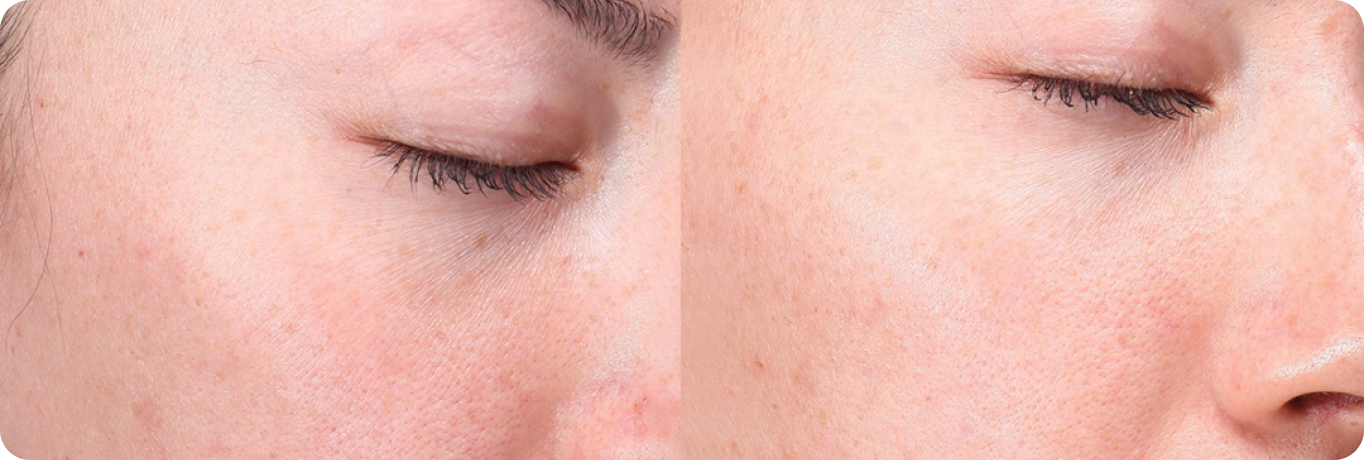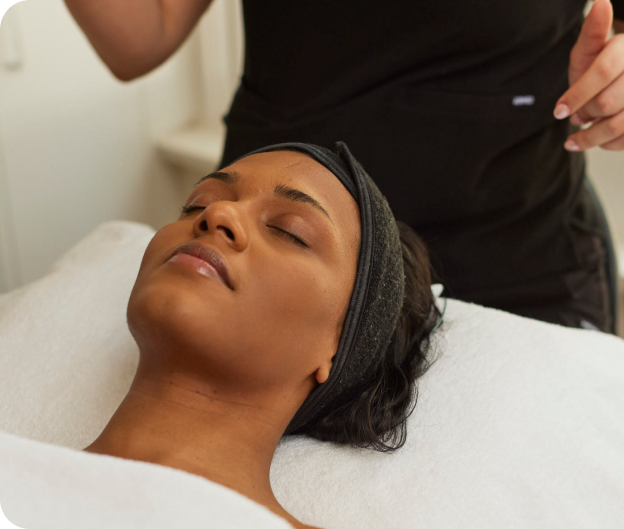Pigmentation and discoloration are commonly addressed at Skindepth. Our highly effective approach to treating these issues includes the use of Skindepth’s advanced medical-grade pigment laser technology, which ensures safe and effective treatment customised for all skin types.
The Pastelle Q-Switched Nd:YAG Laser uses photoacoustic energy to target pigmented lesions within the epidermal or dermal layer of the skin. The Pico laser technology offers versatility through short-pulsed energy and can be adjusted for various skin types and conditions, allowing for customized treatment plans that enhance safety and effectiveness,
particularly for patients with darker skin tones. As the pigment absorbs the light, the laser heats up and shatters the pigment, drawing it to the surface without damaging the surrounding tissue. The natural immune response to this treatment removes these cells from the body within a 4-6 week period.
This treatment is suitable for people suffering from melasma, pigmentation, non-cancerous growths, uneven skin tone, enlarged pores, hyperpigmentation, discolouration, tattoo's and age spots. A dermatologist review is required before treating all pigmented lesions.

PICO laser is an advanced medical device designed to deliver laser energy in extremely short pulses in the picosecond range (one trillionth of a second). This ultra-short pulse duration enables a safe and effective treatment while precisely targeting pigment particles in the skin, such as those found in tattoos, pigmented lesions, and certain types of skin discoloration like melasma. This technology allows for less heat being generated in the surrounding skin tissue, reducing the risk of damaging the skin and or adverse reactions,. while increasing the efficacy and suitability for darker skin types. Additionally, PICO laser's versatility allows it to be used for a variety of skin concerns beyond tattoo removal and pigmentation issues, including acne scars, fine lines, and overall skin rejuvenation while being safe and effective for a range of skin types.
The 1940 setting: The 1940 wavelength targets the epidermis and results in a superficial skin resurfacing that requires no numbing. This gives balanced even skin tone and refines the skin texture.
Our choice for those desiring a skin texture improvement a visible reduction in pigmentation, sun spots, photodamage, fine lines and a more even complexion.
The 1550 and 1940 can be performed separately or combined and can treat face, neck, decollatage and hands.
-
Is the treatment painful?
The sensation is described as being like an elastic
band flicking your skin with some heat. Some areas on the face are more
sensitive than others such as the upper cheeks and nose. A cool cryogen spray
is emitted throughout the treatment when pulsing the skin to help cool it down.
This reduces excess heat and redness within the skin. The skin can feel like it
is sunburnt post-procedure. -
How long is the treatment?
The treatment length depends on how large the area is being treated. Typically, appointments range between 15 minutes - 1 hour.
-
What is the expected downtime with treatment?
All skin types are different therefore downtimes can vary. Swelling and redness can last anywhere between 3-5 days post treatment. Temporary darkening of the skin can occur for up to 7-14 days. Micro-crusting can occur on the face between days 3-7 or on the body between days 3-14 post treatment. If the skin bruises then this can last anywhere between 5-7 days.
• Melasma
• Sun damage
• Skin Cancer (melanoma)
• Post inflammatory hyperpigmentation (especially from acne or eczema)
• Solar lentigo
• Seborrheic Keratosis
Melasma requires correct diagnosis and strict photo protection. It can be treated with a combination of cosmeceutical grade skin care, medical fading creams and sometimes tablets. Chemical peels can be helpful. Lasers are generally not used these days for melasma as they risk making the condition worse.
Sun damage requires dermatologic assessment and if deemed benign can very effectively be treated with pigment lasers, such as the Pastelle Laser. Patients should allow for 1-2 treatments with 1-2 weeks of downtime that can be covered with make up. Some spots can recur with time over years. Suspicious pigmentation should be biopsied or removed surgically.
Sun damage requires dermatologic assessment and if deemed benign can very effectively be treated with pigment lasers, such as the Pastelle Laser. Patients should allow for 1-2 treatments with 1-2 weeks of downtime that can be covered with make up. Some spots can recur with time over years. Suspicious pigmentation should be biopsied or removed surgically.
Post inflammatory pigmentation requires treating the underlying inflammatory condition. For example many people get brown marks on the skin from acne. This is not scarring. It may improve with skin care, chemical peels and some medicated creams or pigment laser.
-
What is the best Cream for pigmentation
Depending on the cause of the pigmentation, a fading cream such as a prescribed tyrosinase inhibitor like hydroquinone can be very effective. There are many non prescription grade options such as mela cream and other topical antioxidants. Vitamin C, Vitamin B, Alpha hydroxy acids and retinol are also great pigment treaters. Dermaceutic Melacream: A cream designed to prevent further pigmentation and lighten existing discolouration. Containg: Kojic Acid, Niacinamide, Retinol, Salicylic Acid, Phytic Acid, Licorice Extract, and Mandelic Acid. Perfect for someone looking for an active that delivers for both pigment and ageing concerns.
Aspect Complete Pigment Plus: A light-weight serum suitable for sensitive skin types as well as those pregnant and breastfeeding. Containg: A blend of ingredients that regulate and inhibit pigmentation. Formulated with Tranexamic acid; an amino acid to diminish the appearance of existing dark spots and further prevent future pigmentation. Niacinamide (Vit B3) balance over all skin barrier and appearance. Plus, a signature blend of Australian botanicals. . -
What is the best treatment for pigmentation?
The best treatment for pigmentation will depend upon the cause of the pigmentation. Sometimes no treatment is necessary as some types of pigment will fade naturally.
-
What is the difference between melasma and pigmentation?
They can be one and the same. Melasma is a form of pigmentation that is hormonal. It is often brought on by pregnancy, contraceptive pills and sun light exposure.
-
How do you treat hyperpigmentation?
Hyperpigmentation treatment depends on the cause of the hyperpigmentation. In many cases topical hydroquinone would be used especially if it is a result of a laser treatment. We would mostly chose to use hydroquinone before laser in those who are prone to hyperpigmentation. A consultation with a dermatologist is required or this.
-
Can pigment be removed?
Pigmentation can absolutely be removed! However, Melasma is a chronic condition that never completely resolves, we can simply manage triggers are improve the appearance.
-
My skin is discoloured, what do I do?
If your skin is discoloured consider your sun protective measures such as SPF and protective clothing (hat, sunglasses etc) Also, consider topical skincare that can brighten the skin. It is best to consult with a dermal clinician to consider the best products for your skin concerns.
Skin Conditions
Acne Dull Skin Enlarged Pores Pigmentation & Discolouration Redness Wrinkles & Volume Loss- Choosing a selection results in a full page refresh.
- Opens in a new window.
